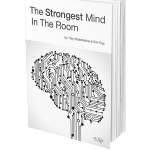“I am a first-time experiencer of all of the ups and downs that come with starting an enterprise from scratch.”
Priti Patel is the founder and CEO of MindPoint, where she teaches companies how to incorporate mindfulness and meditation into their workspace for the benefit and health of their employees. Part of what makes Priti a great meditation teacher is that she can identify with her students: meditation helped her manage stress when she worked in finance at General Electric. Priti also meditated in business school and taught and inspired many of her peers to do so, too. She told us what inspired her to dive into meditation and how it’s helped her as a new entrepreneur.
Why did you start meditating? What was your goal?
I realized I was missing a sense of fulfillment in my life. Even though I was living a great life, traveling the world and was in good health, I knew something was missing. That prompted me to quit my job in Corporate America, take a month off and live in an ashram in India nestled in the Himalayan Mountains on the banks of the Ganges River.
I arrived with no goal. I just knew I was interested in meditation by way of my yoga practice. Before I did the month of immersion in meditation and silence, I had only experienced a few glimpses of how amazing meditation could be while on the yoga mat. The experience granted me a sense of clarity along with a sense of appreciation and awareness for ‘the now’ that I was looking for.
What is your meditation routine?
I am always learning and therefore always modifying my routine (or ‘route-in’ as my beloved teacher calls it), but broadly speaking, I spend 20 minutes meditating every morning. Sometimes, if I have had a rather ‘mind-less’ day, I will choose to do an additional 20 minutes in the evening before going to bed. I will occasionally incorporate different styles of meditation which come in many forms – lying down, walking, and even dancing!
Can you tell me a story about how meditation improved your performance, productivity, creativity, or leadership?
Meditation allows me to practice equanimity, which can be defined as evenness in temper regardless of the situation. As a new business owner, equanimity is crucial for me. I am a first-time experiencer of all of the ups and downs that come with starting an enterprise from scratch. There are days where the news received can be really disheartening, and days where I am on cloud nine. Not to mention there is a constant pressure I place on myself to prove to the world my idea is worth buying.
Due to circumstances out of MindPoint’s control, we recently lost our first long-term contract with a customer. The old me would have let those emotions and stress take me as low as they wanted. However, by practicing equanimity, I was able to remove myself from the situations and witness my emotions without attachment or self-judgment. Not only did I bounce back quicker, I also found myself immediately ready to learn from the situation and make improvements for the future.
Do you think meditation gives you a competitive edge? Why?
Absolutely – my mindfulness practice allows me to accomplish more in a day, prioritize my goals better, and stay more focused and calm even when stress should be eating me alive.
But, I didn’t keep these benefits a secret, so I guess it isn’t a competitive edge except when you compare it against my old self. I just received my MBA from Kellogg School of Management at Northwestern University. As a top 5 ranked business school, the stress at Kellogg is palpable and stems from competing priorities that all students juggle: recruiting, networking, academic and extracurricular obligations. When I realized how beneficial mindfulness was for me, I shared ‘my edge’ with all my peers by teaching free mindfulness classes in our student lounge. The experience served as the inspiration for my business, MindPoint. I also hosted a panel with 3 of Kellogg’s top professors to discuss how mindfulness helped them find professional success. Over 200 of my peers attended, which was incredible testament that mindfulness had impacted and helped my peers as well.
What continues to motivate you to meditate regularly?
When I was living at the ashram, the transformation I underwent was by no means immediate, and I was discouraged many times. Meditation requires practice and is a lifelong journey, I was told. It took me a while to accept that my experience would be different every time I sat on the cushion. I also had to learn to not form expectations of what my experience would be before I even sat down for meditation.
Now that I am able to do that, I am motivated by the fact that I will simply enjoy and witness whatever comes up in my practice. This acceptance for what is has illuminated my life well beyond my meditations and impacts the way I perceive my life and the world. I encourage all readers to have patience with their practice and to stay curious without judgment. And then, as my teacher says, “simply experience the difference that experience makes.”
Get your free chapter of The Strongest Mind in the Room: How Meditation Boosts Human Performance. Find free guided meditations on our How to Meditate Coach.me Guide.
[Tweet “How I Meditate: @coachdotme interviews @mindpointinc founder Priti Patel”]
